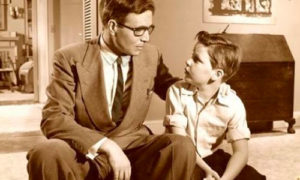
I’ve argued with my husband in front of our kids and I think they are better for it.
Yes, you read this right. I’m not talking about a nasty fight, where pots are flying and fists are pumping but the run of the mill one where hunger, frustration, mess, stress and exhaustion have hijacked your last nerve and your partners comments or actions become the tipping point.
I’ve often wondered if any parent has the presence of mind, the control and restraint to not “lose it’ in front of their kids?
I know the answer to that question….my husband’s parents. He told me once, he has never observed his parents have even one disagreement in front of him.
I felt extremely unsettled when I first heard this. I also found it extremely difficult to wrap my head around the fact arguments, disagreements, fights, call it what you may, could be so well hidden or even absent from a home.
Take two people, socialized completely differently, whose unique experiences formed their individual values, ideas and beliefs. Now…put them both together under the same roof and you have a situation ripe with conflict.
Conflict is not something that we tend to value in our society. We have been socialized towards a deep aversion to CONFLICT. We avoid it at all costs, we smile when we don’t feel like smiling, we speak quietly and we suppress our true feelings….often.
In fact, many of our most valuable emotions have been relegated to the naughty pile.
I’ve stopped seeing those moments as a “Bad Parent” experiences and recognize that my kids are developing skills they would never have without it. So, instead of reprimanding myself and thinking how awful I am, I switched my mind onto the opportunities which allow my kids to be exposed to more of conflict.
Why?
Because conflict occurs on the playground, in class, with the teacher, in the home, at the neighbor’s house and all throughout their adult life. Why should we shield, hide or deny it, because conflict is a great teacher. Kids build resilience, they grow from their mistakes, it requires them to reflect, empathize and negotiate to find a resolution and develop tolerance and forgiveness first hand.
Like a muscle this skill needs to be developed and it never will if parents manage all conflict on a child’s behalf because parents are worrying whether their child will
- Eliminate all his friends
- Make enemies on the playground
- Make them look like bad parents
for even a fraction of a second. Nor will it develop if you think they see Mom and Dad all sunshine and sparkles 24/7.
Often parents get tense wanting to hide conflicts or fights from their child and the resolution is done out of your child’s sight. Even giving the silent treatment or other forms of passive aggressive fighting is never truly hidden from kids. Kids are way too smart for that.
Studies have shown that when a child observes conflict (between parents) and is privy to the whole cycle, from differing opinions, irritation, upset, impasse and then watch the persistence and tenacity used to get to resolution and reconnection, they learn they no longer need to be afraid of conflict, because they realize that conflicts have a beginning and middle and an end where the issue gets resolved.
There is also no point in trying to teach 100% emotional control to our kids because humans are emotional creatures first. It’s how our brains evolved.
All our emotions are here to teach and meant to be explored, each emotion, even anger, jealousy and rage, deserve a place at the table. Those feelings are not to be picked over, denied, suffocated or pretended away, deciding that some are more virtuous than others.
When this occurs, kids learn shame. They begin to see part of them as ugly. The emotions they feel become so confusing and coupled with a parents own lack of acceptance for certain feelings, they disassociate from that part of them. All of a sudden you have kids that become fragmented and unwhole and that is where neuroses, pathologies, depression etc start to take hold.
So how do you find beauty in anger and conflict? How do you build understanding and acceptance for these emotions?
Perhaps we start by trusting our kids to learn and resolve conflict by experiencing it fully. By getting it wrong a few times and then being there to walk them, hand in hand, from problem to solution.
Here’s a recent discussion I had with my 6 year old after he overhead our (husband and I) snarly and agitated voices.
Son: “Why are you both upset right now”
Me: “Right now I’m struggling to find a way to be patient with Daddy’s idea and I feel frustrated and angry”
Son: “Oh, what happened”
Me: “Your Dad and I are trying to resolve a difference in an opinion, but we are committed to working through it and I know we will find a way, because we will never give up until we find it”
Son: “Okay” (runs off and plays nearby)
A short while after, my husband and I find our happy place.
Mom and Dad to Son: “We were both struggling to stay calm in that moment but we talked about it, realized that talking over each other was not helping and listened attentively to what the other was feeling.
It helped that we took a moment to breathe deeply so I could relax and calm down. Once we did that, it became easier for us to calm down and support each other”
Just like when you get upset with your sister, it’s important you talk it out and if no one is around, find a way to get out of your head and into your body by breathing. Then you think clearly and can better understand where the other person is coming from. Sorry if we raised our voices or worried you but I want you to know that we will always try our best to work things out and try to respect each other ok. Does that make sense?”
Son: “Yes” big hugs all around and group kiss.
Trying to shield kids from 100% of the conflict in their life does them a dis-service.
Teaching kids how to fight, learning how to resolve real world problems, giving them language to express themselves as well as showing them how to deal with their own emotions and the emotions of others, is essential at a young age.
Fighting in front of the kids, can be a true gift, creating greater intimacy and depth in a relationship and can often be a blessing in disguise.
Would love to hear your thoughts on conflict and how you handle it in the home with kids around. Please write a comment and share it!
Smiles,
Rhea





9 Comments
… [Trackback]
[…] Read More Info here to that Topic: buildgreatminds.com/2013/11/10/why-its-good-to-argue-in-front-of-the-kids/ […]
… [Trackback]
[…] There you can find 65874 additional Information on that Topic: buildgreatminds.com/2013/11/10/why-its-good-to-argue-in-front-of-the-kids/ […]
… [Trackback]
[…] There you can find 65882 additional Info on that Topic: buildgreatminds.com/2013/11/10/why-its-good-to-argue-in-front-of-the-kids/ […]
… [Trackback]
[…] Read More to that Topic: buildgreatminds.com/2013/11/10/why-its-good-to-argue-in-front-of-the-kids/ […]
… [Trackback]
[…] There you will find 62000 more Info to that Topic: buildgreatminds.com/2013/11/10/why-its-good-to-argue-in-front-of-the-kids/ […]
… [Trackback]
[…] There you will find 61991 additional Information to that Topic: buildgreatminds.com/2013/11/10/why-its-good-to-argue-in-front-of-the-kids/ […]
… [Trackback]
[…] Find More on to that Topic: buildgreatminds.com/2013/11/10/why-its-good-to-argue-in-front-of-the-kids/ […]
… [Trackback]
[…] Read More Info here on that Topic: buildgreatminds.com/2013/11/10/why-its-good-to-argue-in-front-of-the-kids/ […]
… [Trackback]
[…] Info on that Topic: buildgreatminds.com/2013/11/10/why-its-good-to-argue-in-front-of-the-kids/ […]